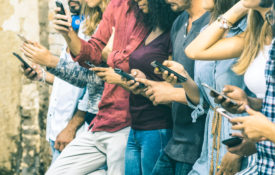-
Parents Are Losing Their Minds Over Masks in Schools
On the first day of school last week, Kelly Carothers picked up her 5-year-old twins from the bus stop and noticed that the kids weren’t wearing their masks. “It’s hot on the bus,” they explained, “and no one else was wearing one.” She asked if they had worn them throughout the school day. “Well,” they said, “sometimes.” The incident confirmed Carothers’s worst fears about this school year. Public-school students in her Florida county, Hillsborough, are technically required to wear masks to school. But in an attempt to please everyone, parents may opt their kids out of mask wearing by signing a form. Masks also remain optional for teachers.
-
Coping With The Reality Of Climate Change
AUDIE CORNISH, HOST: The U.N. has said that it is unequivocal that humans have warmed the Earth and that the scale of the changes is unprecedented. And the predictions are dire - more drought, more fires, heat waves - if we don't change our ways. And it's not the first time we've heard it, though the evidence linking human behavior to climate change is now stronger. So that got us wondering, how does such overwhelming news affect us and our desire to do something about it? We're joined now by Dr. Elke Weber, professor of psychology at Princeton University, and she also contributed to the U.N.'s latest climate report. Welcome to the program.
-
Why This Stage of the Pandemic Makes Us So Anxious
With the threat from the delta variant bearing down across the United States, it’s almost hard to remember the heady days earlier this summer when many of us were experiencing relief, joy, even euphoria as we began to resurface from the pandemic. Barbecues with friends, dinners out, live music, connecting with people face-to-face — all of the antidotes to isolation we’d been craving became tangible realities.
-

Stressed Teens Benefit from Coping Online, but a Little Goes a Long Way
Cell phones and social media can help teens cope with stressful events—as long as they strike the right balance between spending time online and pursuing other coping activities. Visit Page
-

New Content From Perspectives on Psychological Science
A sample of articles on personality and arts education, neuroscience, inner-experiences, emotions, moral judgments, dual- and single-process models, biases holding back theorizing in psychological science, and habits and goals. Visit Page
-
How to Build Positive, Long-Lasting Habits, According to Psychologists
For many of us, the past year has disrupted deeply ingrained habits. Some people report exercising less, others are drinking more. As we look forward to life returning to some semblance of normal, it's worth considering what scientists have learned about how to create good habits and break bad ones. Habits are like shortcuts — they're things we can do quickly and without thinking because we've done them so often they've become automatic, says behavioral scientist Katy Milkman of the University of Pennsylvania.

